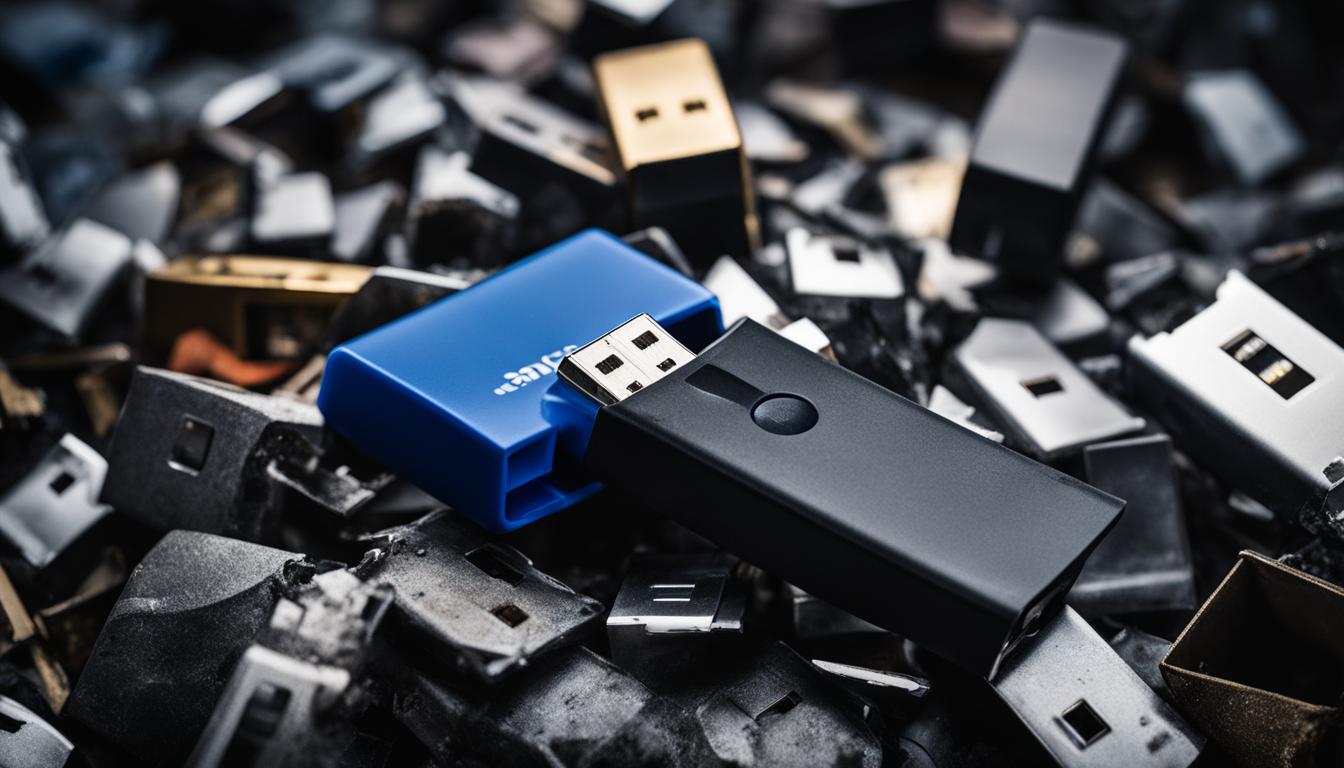Welcome to our blog post on the risks of cheap storage media. In today’s digital age, where data is a valuable asset, it’s essential to understand the potential dangers associated with using low-cost storage options. From data loss to inadequate security measures, cheap storage media can pose significant risks to your valuable information.
Before we delve into the specifics, let’s take a moment to consider the broader implications. The National Institute of Standards and Technology (NIST) has highlighted the importance of media sanitization, which renders access to target data on the media infeasible. This process is crucial to protect against unauthorized disclosure and emphasizes the need for practical decision-making when it comes to safeguarding your data.
Key Takeaways:
- Cheap storage media can lead to data loss, low durability, and unreliable performance.
- They are vulnerable to physical damage and have a shortened lifespan.
- These media increase the risk of malware infection and often have inadequate security measures.
Understanding the Risks of Data Loss
When it comes to storing your valuable data, opting for cheap storage media comes with its fair share of risks. One of the major concerns is the higher likelihood of data loss compared to higher-quality alternatives. The National Institute of Standards and Technology (NIST) highlights the importance of protecting data from unauthorized disclosure, emphasizing the need for effective sanitization techniques and secure storage media.
Cheap storage media often have lower reliability, which can lead to data loss due to hardware failure or corruption. The NIST Special Publication also warns about inadequate security measures on cheap storage media, making the data more vulnerable to unauthorized access and theft. Without proper safeguards, your valuable information could be at risk.
In today’s digital age, data loss can have severe consequences for individuals and businesses alike. It can result in financial loss, a breach of personal privacy, or even legal implications. It is essential to make informed decisions when it comes to choosing storage media and prioritize data protection to mitigate the risks associated with cheap alternatives.
| Risks of Cheap Storage Media | Impact |
|---|---|
| Data Loss | Higher likelihood due to lower reliability and hardware failure |
| Inadequate Security Measures | Increased vulnerability to unauthorized access and theft |
“Investing in higher-quality storage media with robust security features can significantly reduce the risk of data loss and unauthorized access. It is crucial to prioritize data protection to safeguard your valuable information.” – NIST Special Publication
Protecting your data is not just about selecting the right storage media. It also involves implementing proper backup strategies, regularly updating security software, and educating yourself about cyber threats. By taking proactive measures, you can minimize the risks of data loss and ensure the safety of your valuable information.
References:
- NIST Special Publication 800-88 Revision 1: Guidelines for Media Sanitization
Unreliable Performance and Vulnerability to Damage
Cheap storage media, although affordable, are often plagued by unreliable performance and vulnerability to damage. These drawbacks can have significant consequences for the safety and longevity of your data.
According to the NIST Special Publication, using cheap storage media can result in slower data access and an increased risk of data corruption. The inferior quality of these media leads to inconsistencies in performance, causing frustrating delays when accessing or transferring data. Additionally, the unreliability of cheap storage media increases the likelihood of data corruption, making it difficult to retrieve or use the stored information.
Not only are cheap storage media prone to performance issues, but they are also more vulnerable to physical damage. Drops, impacts, or exposure to extreme temperatures can easily render these media useless, resulting in permanent data loss. It is essential to handle them with utmost care to minimize the risk of damage and ensure the safety of your valuable data.
| Drawbacks of Cheap Storage Media | Consequences |
|---|---|
| Unreliable performance | Slower data access, increased risk of corruption |
| Vulnerability to damage | Higher risk of permanent data loss |
Considering the risks associated with unreliable performance and vulnerability to damage, it is advisable to invest in higher-quality storage media. Although they may come at a higher price, these media offer better reliability, performance, and durability, ensuring the long-term safety of your valuable data.
Risks of Cheap Storage Media: Shortened Lifespan and Susceptibility to Corruption
Cheap storage media can pose significant risks to the lifespan and integrity of your data. Unlike higher-quality options, these affordable alternatives are more prone to failures, corruption, and ultimately, data loss. Understanding the risks associated with cheap storage media is crucial in order to make informed decisions about protecting your valuable information.
One of the main drawbacks of cheap storage media is their shortened lifespan. According to the NIST Special Publication 800-88 Revision 1, using low-quality media increases the likelihood of data loss over time. This means that important documents, cherished memories, and critical files may become inaccessible or irretrievable sooner than expected. Investing in higher-quality storage media can help mitigate this risk and ensure the longevity of your data.
In addition to a shortened lifespan, cheap storage media are also more susceptible to corruption. This is particularly concerning as corrupt data can render your files unreadable or unusable. The NIST Special Publication highlights the importance of effective sanitization techniques, which are crucial in preventing data corruption. By using reputable storage media with robust error-correction mechanisms, you can significantly reduce the risk of data corruption and improve the overall integrity of your files.
When considering storage options, it’s important to prioritize the longevity and integrity of your data. While cheap storage media may seem like a cost-effective solution in the short term, they can ultimately result in permanent data loss and compromised files. Investing in higher-quality storage media with a longer lifespan and better protection against corruption is a proactive measure to safeguard your valuable data.
| Drawbacks of Cheap Storage Media | Higher-Quality Storage Media |
|---|---|
| Shortened Lifespan | Extended Lifespan |
| Susceptibility to Corruption | Better Protection Against Corruption |
| Data Loss Risks | Reduced Data Loss Risks |
| Increased Risk of Unreliable Performance | Improved Performance and Reliability |
Using cheap storage media can be a false economy. While the upfront cost may be lower, the risks of shortened lifespan and susceptibility to corruption far outweigh the initial savings. Protecting your data from potential loss and corruption should be a top priority, and investing in higher-quality storage media is a proactive step towards securing your valuable information.
Risks of Cheap Storage Media: Increased Risk of Malware and Inadequate Security Measures
Cheap storage media present a significant risk when it comes to malware infections and inadequate security measures. These affordable storage options often lack robust security features, making them susceptible to malware attacks and unauthorized access. The consequences of such breaches can lead to data loss, compromised systems, and breaches of sensitive information.
In today’s digital landscape, cyber threats are becoming increasingly sophisticated, and it is crucial to prioritize data security. Unfortunately, cheap storage media are more vulnerable to malware infections due to compromised software or infected files. Without proper security measures, these media can inadvertently introduce malware into your system, leading to a range of detrimental consequences.
It is essential to understand that using cheap storage media can expose your data to significant risks. The lack of adequate security measures can leave your information susceptible to unauthorized access and theft. Furthermore, the increased risk of malware infections can compromise the integrity and confidentiality of your data. To protect your valuable information, it is advisable to invest in higher-quality storage media that offer better security features and protection against malware attacks.

Examples of Risks Associated with Cheap Storage Media:
- Data Breaches: Inadequate security measures on cheap storage media can lead to data breaches, compromising sensitive information and exposing it to unauthorized individuals.
- Data Loss: Due to their unreliable performance and susceptibility to corruption, cheap storage media have a higher risk of data loss, potentially resulting in the permanent loss of valuable information.
- Malware Infections: Cheap storage media often lack robust security features, making them more prone to malware infections that can lead to unauthorized access, system compromise, and data breaches.
- Unreliable Performance: Cheap storage media may offer slower data access and unreliable performance, impacting productivity and hindering efficient data retrieval.
- Vulnerability to Damage: These storage media are more susceptible to physical damage, such as drops or exposure to extreme temperatures, which can result in permanent data loss.
Considering the potential risks associated with cheap storage media, it is crucial to prioritize data security and invest in higher-quality options. By choosing reliable storage media with robust security features, you can minimize the chances of malware infections, data breaches, and data loss, ensuring the safety and integrity of your valuable information.
| Risks of Cheap Storage Media | |
|---|---|
| Data Breaches | Inadequate security measures can lead to unauthorized access and exposure of sensitive information. |
| Data Loss | Unreliable performance and susceptibility to corruption increase the risk of permanent data loss. |
| Malware Infections | Lack of robust security features exposes cheap storage media to malware attacks and system compromise. |
| Unreliable Performance | Slower data access and unreliable performance impact productivity and data retrieval. |
| Vulnerability to Damage | Cheap storage media are more prone to physical damage, leading to potential data loss. |
Conclusion
When it comes to storage media, it’s essential to be aware of the risks associated with using cheap options. These media often come with inadequate security measures, leaving your valuable data vulnerable to breaches and unauthorized access.
Not only that, but cheap storage media are also prone to damage. Their lower durability makes them susceptible to physical harm, such as drops or exposure to extreme temperatures, which can lead to permanent data loss.
To safeguard your valuable data, it is highly recommended to invest in higher-quality storage media. These options offer robust security features, better durability, and longer lifespans, reducing the risks of data breaches, unauthorized access, and permanent loss.
FAQ
What are the risks of using cheap storage media?
Cheap storage media can pose significant risks to your valuable data, including data loss, low durability, unreliable performance, vulnerability to damage, shortened lifespan, susceptibility to corruption, increased risk of malware, and inadequate security measures.
Why is data loss a concern with cheap storage media?
Cheap storage media have a higher risk of data loss compared to higher-quality alternatives. They may have lower reliability, leading to data loss due to hardware failure or corruption. Inadequate security measures can also make data more vulnerable to unauthorized access and theft.
How does cheap storage media affect performance and vulnerability to damage?
Using cheap storage media can result in unreliable performance, leading to slower data access and increased risk of data corruption. These storage media are also more susceptible to physical damage, such as drops or exposure to extreme temperatures, which can lead to permanent data loss.
What is the impact of cheap storage media on lifespan and susceptibility to corruption?
Cheap storage media have a shorter lifespan compared to higher-quality options. They can result in a shortened lifespan, leading to a higher risk of data loss over time. Additionally, cheap storage media are more susceptible to corruption, which can render the stored data inaccessible or unusable.
Are cheap storage media more susceptible to malware infection?
Yes, cheap storage media pose an increased risk of malware infection. They may not have robust security features, making them more susceptible to malware attacks. Infected files or compromised software on the storage media can lead to unauthorized access, data breaches, or system compromise.
What should I do to protect my valuable data?
To protect your valuable data, it is recommended to invest in higher-quality storage media with robust security features and better durability. Avoid using cheap storage media that may have inadequate security measures and a higher risk of data loss.
